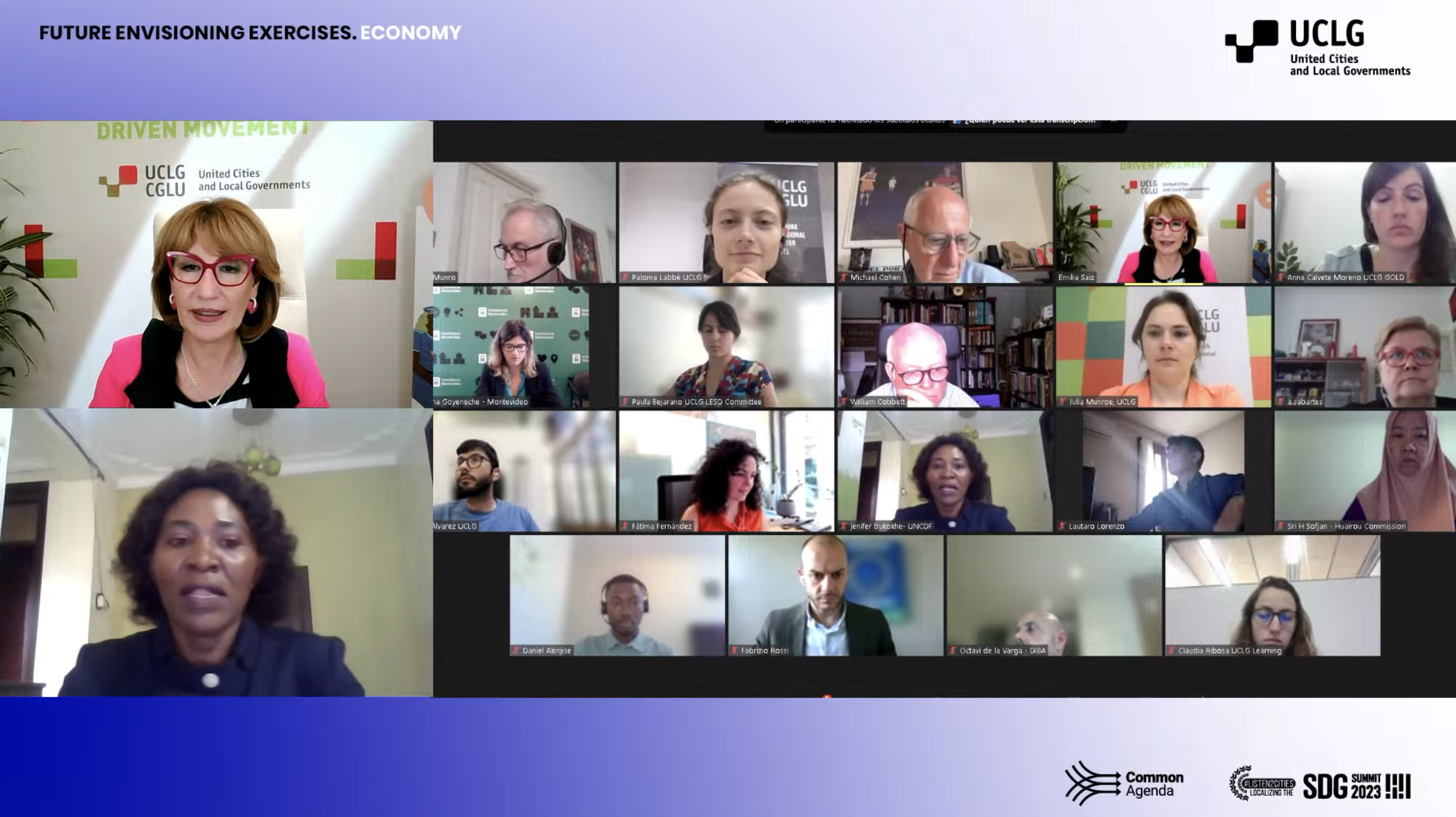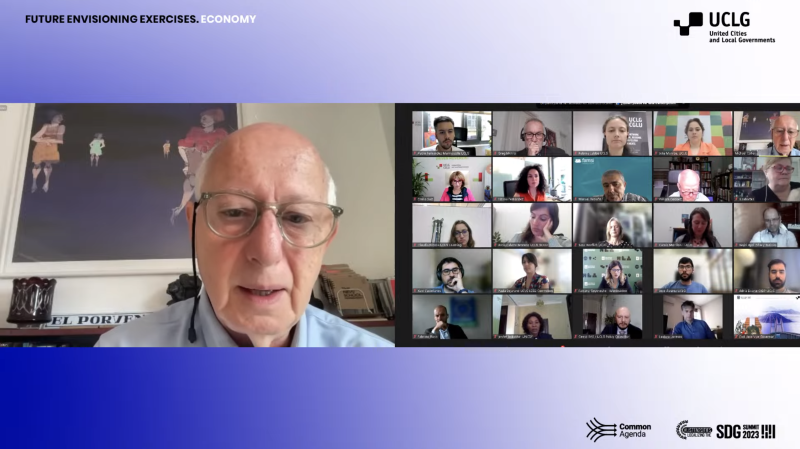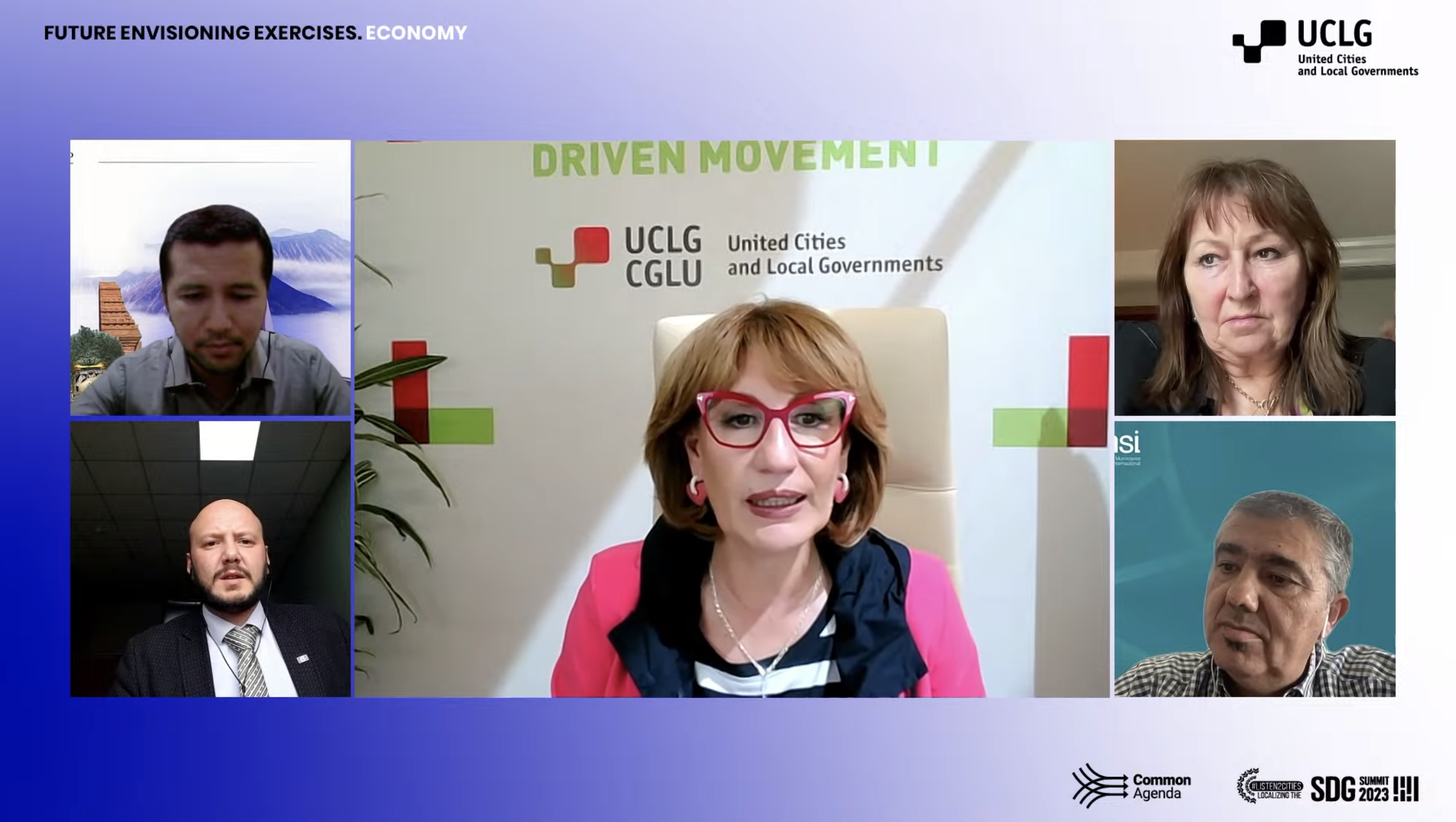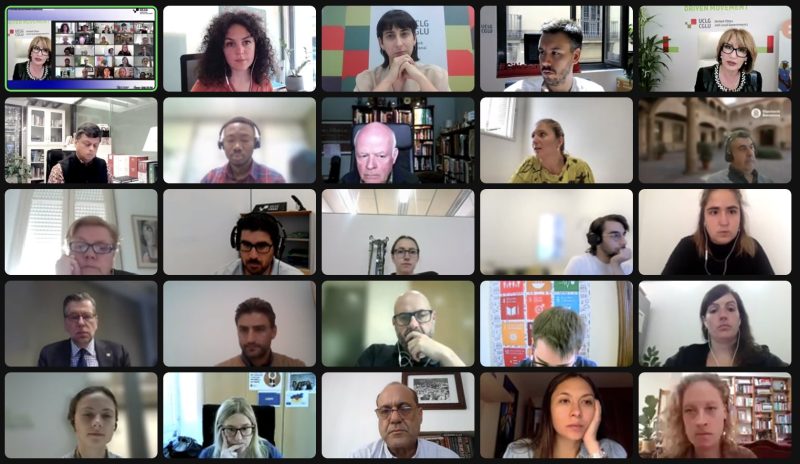Press Release – Future Envisioning Exercise: Redefining Finance and the Economy for a Sustainable Future
09.05.2023
UCLG’s Future Envisioning Exercises, which serve as a means to unfold the Pact for the Future, have been initiated by the UCLG Policy Councils. They are a space of dialogue and co-creation in which the UCLG political leadership, together with organized civil society and partners articulated in the UCLG Town Halls will build bridges to unfold the Pact.
During these, the aim is to explore and discuss how the notions and implementation of the Commons, Finance, Trust, and Governance Architecture will contribute to how the Pact for the Future supports the revision of the 2030 Agenda by the UN General Assembly at the SDG Summit and the 2024 Summit of the Future, which will align with and support the Secretary-General’s “Our Common Agenda.”

Methodology of the Session
The exercise was introduced by UCLG Secretary-General Emilia Saiz, who explained that the intention was not only to focus on why and how to finance local and regional governments. But instead, to adopt a wider lens and discuss the shifts that need to happen to put an end to a system based on never-ending economic growth and extractivism, and that is not leading to just, inclusive and free societies: the ultimate objective being propelling a shift in economic and financial systems that allows to finance urban and territorial equality.
The session was structured into several segments: it began with a virtual consultation introduced by UCLG, which seeked to identify the main characteristics of the current international financial and economic system and what shifts participants believed are necessary to transform it. Concrete contributions on the subject followed, highlighting experiences, innovations and possible applications at the territorial level from UCLG policy councilors, representatives of the UCLG Town Halls and stakeholders. An in-focus segment allowed for partner organizations to express their understanding of what actions and decisions are needed to transform the economic and financial systems and the role of local and regional governments within them.
Presentations of the high-impact contributions were followed by the Agora, the open dialogue space that allowed for sharing ideas among all participants attending the exercise, bringing together innovative policies, facts and aspirations that will be a part of the Vision Document that will come out following the exercise.
Redefining Finance and the Economy as an entry point to the Pact for the Future

Michael Cohen, from The New School, provided an entry point to the exercise, by sharing an inspiring reflection on how to go about reframing the development model and strengthening local government finance. In particular, he stressed the urgency for local and regional governments to be acknowledged as decision makers on finance matters, including by the international multilateral system. While Greg Munro, Director of Cities Alliance and member of the UCLG Caring Systems Town Hall, made the case for people-centered investments for a sustainable delivery of universal and feminist basic public services, underlining the key role of well-informed partnerships for local and regional governments.
“Looking at the recent documents of the UNSG, they express concern about achieving the SDGs’ goals, but they do not mention local and regional governments at all. This is not correct, especially bearing in mind that 80% of GDP comes from cities and that local and regional governments are at the frontline of action. We need to find ways to seriously address this.” Michael Cohen, The New School
“Finance needs to be the facilitator for inclusive development and effective service delivery. (…) Investment decisions need to be made by looking through the eyes of the people who are to benefit from them, most of whom are women, most of whom work in informal employment.” Greg Munro, Cities Alliance and a member of the UCLG Caring Systems Town Hall.
High-Impact Contributions – Commitments to transformation
The Future Envisioning Exercise on Finance and the Economy featured discussions on critical issues for the transformation of economic systems – including the necessity to change financial systems – as well as concrete avenues to do so, such as promoting a new governance architecture that centers people-based decision making and enables local action, guided by feminism and care, and focused on effective and inclusive public service delivery.
In his contribution, Emil Dardak, the Vice-Governor of East Java shared how the COVID-19 pandemic had severe impacts on both service delivery and employment in their territory and while efforts were made to keep up the education and health sectors’ needs, some critical infrastructure spending was halted. The creation of a local government financing entity by the national government to provide 0% interest rate-loans for infrastructure investments enabled local governments to mitigate the pandemic’s impacts. However, the Vice-Governor alerted participants that the current rise of interest rates was a challenge for all subnational governments to take loans and pay back their debt.
Complementarily, Gunn Marit Hegelsen, President of the Norwegian Association of local and regional governments (KS), and UCLG Policy Councilor of the Resilient Cities Policy Council, highlighted how, globally, multilevel governance systems were not fit for responding to the multifaceted emergencies facing our societies and shared the norwegian insights coming from their Voluntary Subnational Review. She highlighted the role played by local leaders in grounding democracy and human rights, stressing the urgency to clarify task allocation across tiers of government and provide for efficient intra-governmental dialogue and coordination. Moreover, such systems must empower local governments with sufficient autonomy and resources for them to execute authority, facilitate local development and deliver services to citizens.
While Manuel Redaño González, Manager of the Federation of Andalusian Municipalities for International Solidarity (FAMSI), and member of the UCLG Local Economic Development Committee, stressed how during the complex context of the pandemic, innovations linking economic development with sustainability and fairness emerged, such as local economic currencies or initiatives related to the circular economy. In response to the energy crisis, other initiatives have stemmed from local communities to reconsider the role of the population with respect to the management and use of energy. Moreover, he emphasized the importance to speak about investment and revenue, but also about the capacity of local governments to develop their own public policies: “the autonomy of local governments needs to be improved to fulfill the Pact for the Future and live up to our responsibilities towards people and the planet.”
For his part, Cemal Baş, City Councillor of Keçiören (Turkey) and Policy Councillor of the UCLG Multilevel governance Policy Council, highlighted the important role played by local and regional government associations. By sharing the experience of the Union of Turkish Municipalities in supporting municipalities’ project management skills, he posed the question to participants: “What initiatives can local government associations undertake to create development investment opportunities for their members?”
The discussion also revolved around the need for a “shared understanding that local government finance is a key component of local development finance”, as put by Jenifer Bukokhe Wakhungu, Deputy Director of Local Transformative Finance Practice at UNCDF. Moreover, she stated, global financial systems alienate less economically developed countries, which calls for the need to to pilot new financial systems that work for these countries, grounded on new partnerships and tailor-made solutions to increase financial flows to local and regional governments, for them to be able to effectively advance local development.

The Agora: Local voices for transforming Finance and the Economy

The Agora discussion allowed to bring other critical topics to the table, such as solidarity and equality. As put by Wajdi Aydi, Deputy Mayor of Sfax (Tunisia) during the Agora discussion: “when we talk about finance and the economy, solidarity is behind all the goals that we need to pursue to achieve real decentralization and liberty”. Sri Sofjan, from the Huairou Commission and the UCLG Feminism caucus raised participants’ attention to the transformational power of feminism and care: “How can care economies enhance economic systems and make them inclusive and equal by including a gendered perspective to economic development? How can examples of women-led groups’ engagement with local and regional governments to improve service delivery contribute to adopting a new way of doing things?” While Billy Cobbet, member of the Drafting Committee of the UCLG Pact for the Future, rounded up the discussion by emphasizing the connections between austerity and inequality: “The majority of national governments are implementing austerity, and in most cases, this austerity is part of a political choice and not of a financial necessity, causing the starvation of LRGs. This starvation exacerbates the inequalities of the vulnerable members of the population.”
The UCLG Future Envisioning Exercise concluded with a commitment to continue and expand the conversation on how economic and financial systems can be transformed and what shifts are necessary to achieve this. The next Future Envisioning Exercises will take place on the 10th to the 11 th of May, focusing on Trust and Governance Architecture.